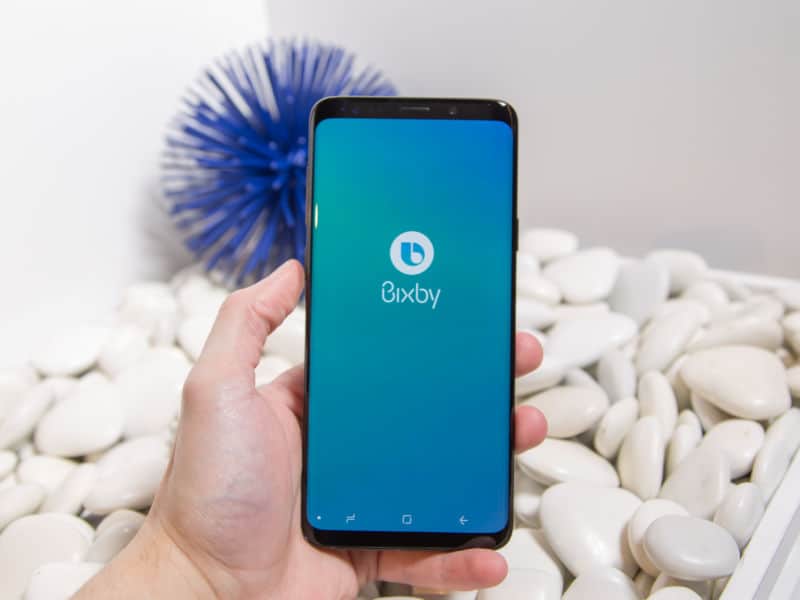Reuters and Bloomberg are both independently reporting that Google is pushing Samsung to back away from its duplicate Android ecosystem and promote Google apps instead. A “correspondence” between the two companies was seen by both sites, which saw Google push Samsung to promote the Play Store and Google Assistant over the Galaxy App Store and Samsung’s Bixby assistant. Google was apparently willing to open its wallet and pay Samsung to make it happen.
Bloomberg’s interpretation of the negotiations is pretty vague, saying the deal “would promote Google’s digital assistant and Play Store for apps on [Samsung] devices.” The later Reuters report is a lot more specific, saying Samsung is “considering dropping its Bixby virtual assistant and Galaxy Apps Store from its mobile devices.” Reuters goes on to say that “Google is dangling more lucrative terms for Samsung than in previous deals if it retreats from its app strategy.” Part of Google’s immense web of Android protection is sharing ad revenue and Play Store app revenue with phone manufacturers, and offering Samsung a higher share is an easy way to bribe the South Korean company into submission.
Whether Samsung would actually be willing to kill Bixby and the Galaxy App store is up in the air. Samsung has invested piles of money in Bixby since its launch in 2017, but Bixby hasn’t been very successful. Samsung acquired the assistant startup Viv Labs, which was founded by the creators of Siri, and put the company to work improving Bixby. But Samsung’s voice assistant still can’t hang in the same crowd as the Google Assistant, Apple’s Siri, and Amazon Alexa.
Voice assistants are primarily interfaces to a search engine and a services ecosystem, two things Samsung doesn’t really invest in, so it has been hard for the company to turn Bixby into something useful. When you say “take a note,” where does it go? Google and Apple both have a sprawling ecosystem for notes, music, reminders, calendar events, photos, maps, and more, all available from your phone and the Web. Samsung’s ecosystem gap means that Bixby relies on a cobbled-together web of third-party services or controlling apps on your Samsung phone, which are mostly forks of Google’s base Android apps.
Samsung’s Bixby ships on its Android devices, its Tizen smartwatches, and on some refrigerators (no, really). But that’s about it. Samsung announced a Bixby smart speaker as the “Galaxy Home” in 2018, but nearly two years have gone by and the product is nowhere to be seen. Samsung pivoted to a cheaper “Galaxy Home Mini” instead, but Home Mini doesn’t seem like it ever became a commercial product either. Samsung offered it as a free bonus for some Galaxy S20 pre-orders in South Korea, but it’s not for sale. The real test of a voice assistant is a smart speaker, which has no interface other than voice, and Samsung doesn’t seem confident in Bixby’s ability to pull this off. The main problem I see with killing Bixby is that it would leave Samsung’s smart watches without a voice assistant at all. I doubt Google would build Google Assistant for Tizen watches.
Samsung’s Galaxy App store is used to update Samsung’s core Android apps that ship with a phone, but there’s really no reason to keep it around for most countries. Relying entirely on the Play Store is tough since Google Play isn’t available in China, so in that country, Samsung’s own app store is useful. The company’s app store doesn’t seem to be entirely successful in China, either, though—the AppInChina App Store Index rates Samsung as the 15th most-popular app store in China.
I have trouble imagining Samsung abandoning Bixby and the Galaxy App Store when it has been so concerned about its reliance on Google in the past. Bloomberg blames the coronavirus for why Samsung would be open to something like this, saying, “the drop in demand for mobile devices during the Covid-19 pandemic has intensified the company’s need for revenue and weakened its negotiating position with a key partner.”
Currently, Google products have very strong default placement on Samsung phones. Both the Play Store and Google Search bar ship on the first home screen, and Google is the default search engine. When we last saw Google’s Play Store and app licensing terms for Android, the location and defaultness of Google services were enshrined in the contract. Google made things like the location of the search bar and Play Store icons a requirement for licensing the company’s closed-source Android apps—Google wanted spots on the home screen.
The EU actually took Google to task for its placement rules, saying that Google’s licensing terms were anticompetitive. Google’s argument was that Android’s development was offered to OEMs for free, and the inclusion and placement of these apps funded its development through ad and app revenue. Google’s concession to EU regulators was to add a paid flexibility tier to Google Play licensing, where OEMs could pay up to $40 to unbundle Google’s apps and placement requirements.
Nothing about Google’s licensing terms stops phone manufacturers from building competing and duplicate services, and on a Samsung phone, the Galaxy App Store also lives on the home screen, right next to the Play Store. Bixby typically gets its own dedicated hardware button on the side of a Samsung phone, and while that is now remappable to a different app, you specifically can’t map it to the Google Assistant.
Reuters says that “the companies are aiming to finalize terms by Friday.” Samsung’s Galaxy Note 20 launch is next week, which seems a bit too early to see any dramatic software changes. But we’ll be on the lookout for the prominence of Bixby in the company’s presentation.

